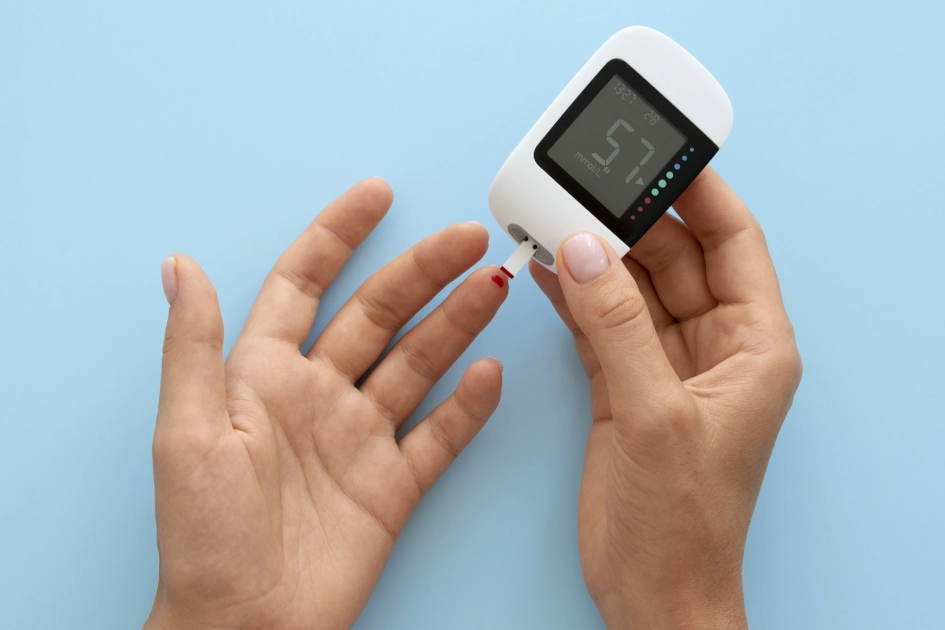
With the rising prevalence of metabolic disorders, the rapid emergence of various types of novel therapeutic agents has been the need of hour. Amongst all the recently available anti-obesity drugs, Tirzapatide developed by Eli lilly and company stands out as a promising avenue for individuals dealing with the complexities of diabetes and obesity.
Tirzepatide, a dual glucose-dependent insulinotropic polypeptide (GIP) and glucagon-like peptide-1 (GLP-1) receptor agonist, offers a paradigm shift in the treatment regimen for type 2 diabetes mellitus and obesity management (1,2,3).
Tirzapatide uses an innovative approach that uses the synergistic effects of GIP and GLP-1 to exert profound glycemic control and induce significant weight loss, thereby addressing two cardinal features of metabolic dysfunction.
The clinical efficacy of Tirzepatide is underscored by numerous robust trials, illuminating its transformative impact on glycemic management and body weight reduction. From pivotal Phase 3 studies to real-world observational analyses, there is substantial data that paint a compelling picture of Tirzepatide’s superiority over conventional therapies, offering not only superior glycemic control but also tangible benefits in terms of body weight reduction and mitigation of major adverse cardiovascular events.
Moreover, the favorable safety profile of Tirzepatide, characterized by a low incidence of hypoglycemia and gastrointestinal serious adverse events, makes it a cornerstone therapy for all metabolic disorders.
Let’s dig into the benefits offered by Tirzapetide in more detail and make a decision for yourself whether Tirzepatide should be your go-to obesity medicine or not!
Glycemic Control:

Tirzepatide’s mechanism of action involves the activation of both GIP and GLP-1 receptors, which leads to enhanced insulin secretion and reduced glucagon release in a glucose-dependent manner (4). This dual agonism amplifies the physiological response to elevated blood sugar levels, promoting tighter glycemic control without increasing the risk of hypoglycemia.
Additionally, clinical trials have demonstrated superior reductions in HbA1c levels as Tirzepatide improves insulin sensitivity in peripheral tissues, facilitating glucose uptake and utilization (3,5,6).
The net effect is a significant reduction in HbA1c levels, reflecting improved long-term glycemic management and a lower risk of diabetes-related complications such as neuropathy, retinopathy, and nephropathy.
Weight Reduction:

Tirzepatide’s impact on body weight and chronic weight management in individuals with high body mass index (BMI) is multifaceted originating from its effects on appetite regulation, energy expenditure, and adipose tissue metabolism (7,8). By acting on central and peripheral appetite centers, Tirzepatide suppresses hunger signals and enhances feelings of satiety, leading to reduced caloric intake.
Additionally, Tirzepatide promotes thermogenesis and fat oxidation, contributing to increased energy expenditure and the utilization of stored fat reserves.
Clinical trials have consistently demonstrated sustaining weight reduction achieved with Tirzepatide, making it a valuable adjunctive therapy for individuals struggling with obesity or overweight-related comorbidities.
Some studies have shown that simple lifestyle interventions in the form of reduced calorie diet/decreased food intake as well as physical activity can offer additive weight loss and help you achieve your target baseline body weight faster.
Cardiovascular Disease Risk Reduction:

Tirzepatide has garnered attention for its potential to mitigate cardiovascular risk factors and reduce the incidence of major adverse cardiovascular events (MACE) in patients with T2DM (9).
Beyond its effects on glycemic and weight control, Tirzepatide exerts favorable changes in lipid metabolism, including reductions in LDL cholesterol and triglyceride levels, and increase in HDL cholesterol. The role of Tirzepatide in substantially decreasing the cardiometabolic risk factors plays a pivotal role in mitigating the cardiovascular complications.
Moreover, Tirzepatide may improve vascular function and reduce arterial stiffness (optimizing diastolic blood pressure), thereby attenuating the progression of atherosclerosis and lowering the risk of myocardial infarction, stroke, and cardiovascular mortality due to high blood pressure (10,11).
These cardioprotective effects position Tirzepatide as a promising therapeutic agent for individuals with T2DM and established cardiovascular disease.
Renal Protection:
Emerging evidence suggests that Tirzepatide may confer renoprotective benefits, particularly in individuals at risk of or with existing diabetic kidney disease (DKD).
Tirzepatide’s ability to modulate renal hemodynamics, reduce glomerular hyperfiltration, and mitigate renal inflammation and oxidative stress may slow the progression of DKD and preserve renal function over time.
Furthermore, Tirzepatide’s effects on weight reduction and glycemic control may indirectly contribute to renal protection by alleviating the metabolic burden on the kidneys and reducing the risk of chronic disease such as diabetic nephropathy.
Continued research is warranted to elucidate the full extent of Tirzepatide’s renoprotective properties and its potential implications for clinical practice.
Improves Liver Health:
While the association between Tirzepatide and improvement in liver health is an area of exploration and more research is needed, by promoting glucose uptake and utilization in hepatocytes, Tirzepatide helps to mitigate insulin resistance, a key driver of non-alcoholic fatty liver disease (NAFLD) and its more severe form, non-alcoholic steatohepatitis (NASH) (12).
Improved insulin sensitivity as well as Tirzepatide’s ability to attenuate inflammation and oxidative stress may help protect hepatocytes from damage and prevent the progression of liver fibrosis.
NAFLD is characterized by the accumulation of fat in the liver, which can lead to inflammation, oxidative stress, and liver injury. Studies have also shown that GLP-1 receptor agonists, such as Tirzepatide, can lead to improvements in liver enzymes and hepatic steatosis in patients with NAFLD or NASH.
Convenience and Adherence:
Tirzepatide is a once-weekly subcutaneous injectable peptide with maximum tolerated dose makes it a convenient and practical alternative to daily injections or multiple oral medications for individuals with T2DM and obesity.
This simplified treatment schedule reduces the burden of therapy and enhances patient adherence, leading to improved patient reported outcomes and overall satisfaction.
Furthermore, Tirzepatide’s long-acting formulation ensures sustained therapeutic efficacy throughout the week, minimizing fluctuations and improving blood sugar levels.
References:
- Karagiannis T, Avgerinos I, Liakos A, et al. Management of type 2 diabetes with the dual GIP/GLP-1 receptor agonist tirzepatide: a systematic review and meta-analysis. Diabetologia. 2022;65(8):1251-1261. doi:10.1007/s00125-022-05715-4
- Forzano I, Varzideh F, Avvisato R, Jankauskas SS, Mone P, Santulli G. Tirzepatide: A Systematic Update. Int J Mol Sci. 2022;23(23):14631. Published 2022 Nov 23. doi:10.3390/ijms232314631
- Rosenstock J, Wysham C, Frías JP, et al. Efficacy and safety of a novel dual GIP and GLP-1 receptor agonist tirzepatide in patients with type 2 diabetes (SURPASS-1): a double-blind, randomised, phase 3 trial [published correction appears in Lancet. 2021 Jul 17;398(10296):212]. Lancet. 2021;398(10295):143-155. doi:10.1016/S0140-6736(21)01324-6
- Nauck MA, D’Alessio DA. Tirzepatide, a dual GIP/GLP-1 receptor co-agonist for the treatment of type 2 diabetes with unmatched effectiveness regrading glycaemic control and body weight reduction. Cardiovasc Diabetol. 2022;21(1):169. Published 2022 Sep 1. doi:10.1186/s12933-022-01604-7
- Dahl D, Onishi Y, Norwood P, et al. Effect of Subcutaneous Tirzepatide vs Placebo Added to Titrated Insulin Glargine on Glycemic Control in Patients With Type 2 Diabetes: The SURPASS-5 Randomized Clinical Trial. JAMA. 2022;327(6):534-545. doi:10.1001/jama.2022.0078
- Tsukamoto S, Tanaka S, Yamada T, et al. Effect of tirzepatide on glycaemic control and weight loss compared with other glucagon-like peptide-1 receptor agonists in Japanese patients with type 2 diabetes mellitus. Diabetes Obes Metab. 2024;26(1):262-274. doi:10.1111/dom.15312
- Jastreboff, A. M., Aronne, L. J., Ahmad, N. N., Wharton, S., Connery, L., Alves, B., Kiyosue, A., Zhang, S., Liu, B., Bunck, M. C., Stefanski, A., & SURMOUNT-1 Investigators (2022). Tirzepatide Once Weekly for the Treatment of Obesity. The New England journal of medicine, 387(3), 205–216. doi.org/10.1056/NEJMoa2206038
- Lazzaroni E, Ben Nasr M, Loretelli C, Pastore I, Plebani L, Lunati ME, Vallone L, Bolla AM, Rossi A, Montefusco L, Ippolito E, Berra C, D’Addio F, Zuccotti GV, Fiorina P. Anti-diabetic drugs and weight loss in patients with type 2 diabetes. Pharmacol Res. 2021 Sep;171:105782. doi: 10.1016/j.phrs.2021.105782. Epub 2021 Jul 22. PMID: 34302978.
- Sattar N, McGuire DK, Pavo I, Weerakkody GJ, Nishiyama H, Wiese RJ, Zoungas S. Tirzepatide cardiovascular event risk assessment: a pre-specified meta-analysis. Nat Med. 2022 Mar;28(3):591-598. doi: 10.1038/s41591-022-01707-4. Epub 2022 Feb 24. PMID: 35210595; PMCID: PMC8938269
- Wilson JM, Lin Y, Luo MJ, Considine G, Cox AL, Bowsman LM, Robins DA, Haupt A, Duffin KL, Ruotolo G. The dual glucose-dependent insulinotropic polypeptide and glucagon-like peptide-1 receptor agonist tirzepatide improves cardiovascular risk biomarkers in patients with type 2 diabetes: A post hoc analysis. Diabetes ObesMetab. 2022 Jan;24(1):148-153. doi: 10.1111/dom.14553. Epub 2021 Oct 11. PMID: 34542221.
- Tate, M., Chong, A., Robinson, E., Green, B. D., & Grieve, D. J. (2015). Selective targeting of glucagon-like peptide-1 signalling as a novel therapeutic approach for cardiovascular disease in diabetes. British journal of pharmacology, 172(3), 721–736.
- Hartman ML, Sanyal AJ, Loomba R, Wilson JM, Nikooienejad A, Bray R, Karanikas CA, Duffin KL, Robins DA, Haupt A. Effects of Novel Dual GIP and GLP-1 Receptor Agonist Tirzepatide on Biomarkers of Nonalcoholic Steatohepatitis in Patients With Type 2 Diabetes. Diabetes Care. 2020 Jun;43(6):1352-1355. doi: 10.2337/dc19-1892. Epub 2020 Apr 14. PMID: 32291277; PMCID: PMC7245348.


